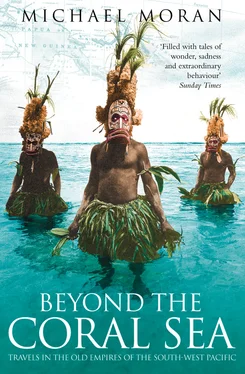‘On Logea Island, near Kwato.’
‘Really? Some people feel that Kwato was where the nation of Papua New Guinea began.’
‘Certainly it was.’
The legendary island mission station of Kwato gives rise to strong passions and controversial opinions. Many of the most distinguished people in public life in the national government attended this mission school. Wallace often lapsed in and out of pidgin which confused me on occasion. Fervent Christianity was obvious in every sentence.
‘The people of Milne Bay and the islands wantim Word of God, very much they wantim. Charles Abel tried to make a new Papuan society that was Christian and educated for working. He taught us boat-building and metalwork. Mainly discipline and concentration he knock it in their heads. Young people don’t want these things now.’ He dealt the cards to himself all the time he spoke, cultivating chance. Dinah was clearing away the remains of the lunch.
‘Respect for custom certainly seems to be passing away.’
‘Gone. Gone now. Young people are too lazy to keep kastom alive. Prayer is the answer to all problems, Michael. You must pray. Even when they stole my television and wrecked my boat I prayed.’ He began to hum a hymn tune I vaguely recognised.
‘Did you get it back?’
‘No. God didn’t want me to watch any more television. It was a sign. I read and write more now.’ His fatalism appeared to be the final tremors of a departing soul.
‘Is anyone else staying here, Wallace?’
‘Yes. Two government ministers. The Prime Minister has stayed here. The High Commissioner in London, Sir Kina Bona, he stayed here. They all know me. We had hundreds at a celebration not long ago. I built a dancing and picnic area beside the guesthouse. Did you see it? That was before the Englishman betrayed me.’ He had stopped the mindless card-dealing and actually looked at me, animated yet with traces of anger.
‘Who was that? What did he do?’
‘Not now. You go out and look at our beautiful island. We’ll talk tonight.’
‘Fine. I’ll have a look at your dancing area.’
‘Ah, yes. Do that. Not many come here now, but in the future we’ll once more have many people …’ His voice trailed away as if he had lost confidence in the remainder of the sentence.
‘I tried to have a shower but there was no water.’
‘No, that’s right. You must tell us first and then we will turn on the pump. Guests usually shower after meals.’
‘I see. Well, I’m going now. See you later on.’
‘All right. Will you come up to the hospital with me sometime? I need some more tablets. Arthritis they say it is.’ He drifted in and out of this world, bolstering himself with prayer and medicine. I dragged the heavy fly-door open and walked out into the fiery furnace of Samarai.
A coral path shaded by coconut palms and pines encircles the island. It is known as Campbell’s Walk after the Resident Magistrate who constructed it in the early 1900s using local labour from the prison. The transparency of the porcelain-blue water is transformed to a deeper cobalt as it reaches down China Strait and out towards the impenetrable mainland and pearly lips of Milne Bay. Small coves with upturned canoes invite fishermen to dream on the rocks. Fibro shacks nestle into the sides of slight hillocks waiting to be consumed by the exuberant palms, bananas, ferns, frangipani and hibiscus. The sound of an electric train instinctively caused me to search the horizon until common sense prevailed and I realised it was the sighing of the pines on the island of Sariba. Two women were cooking over open fires in a kitchen hut adjacent to a narrow beach where a gleaming new dinghy with outboard motor was knocking on the tide. The picturesque schooners and yawls, sails bellying in the wind, carving like swift blades through the currents, have long since disappeared.
I had been walking for only fifteen minutes and was already halfway around the island. One of the most distinguished visitors to Samarai was the anthropologist Bronisław Malinowski. He was delayed here in November 1917 while waiting for the cutter-rigged launch Ithaca , which would take him to the Trobriand Islands. His favourite occupation on this walk was to read Swinburne and write his private diary in Polish. It revealed him as a man who had embarked upon a profoundly personal quest.
Malinowski was born in Kraków, the capital of the Austro-Hungarian province of Galicia in partitioned Poland in 1884. The family would spend part of each year in the Tatra mountains in the Polish summer capital, Zakopane, a resort which became a haven for artists and intellectuals. Around 1904 he read Sir James Frazer’s The Golden Bough , a vast collection of myths and magic from around the world, which inspired him to become an anthropologist and writer. Despite frail health he studied mathematics and physics, being awarded the highest academic honours in the Hapsburg Empire – sub auspiciis Imperatoris 1 – when he graduated in philosophy from the Jagiellonian University of Kraków in 1908. The deputy to Emperor Franz Josef personally presented him with a gold-and-diamond cluster ring at an opulent award ceremony in Kraków. In 1910 he moved to London where he began anthropological studies as a research student at the London School of Economics. He met and corresponded with eminent anthropologists at Cambridge, became a staunch Anglophile and is generally considered to have created the modern subject of British social anthropology.
By 1914 he was in Australia at the outbreak of the Great War. Although an Austrian subject and technically an ‘enemy’, he was given financial support to proceed with his work in New Guinea, first at Port Moresby and then on the island of Mailu. He also made two long trips to the Trobriand Islands from 1915 to 1918 where he followed the example set by the great Russian pioneering ‘ethnologist’, Nikolai Miklouho-Maclay, and formally introduced the concept of extended contact and methodological fieldwork into anthropology. The complex rituals of yam cultivation, the kula trading ring and, most notoriously, the liberated sexual practices of the Trobriand islanders, gave rise to a series of remarkable publications. His works became seminal studies of their kind, controlled, objective, classical and charming accounts of remote peoples. But his private diaries, written mainly in Polish, 1 reveal a more complex figure, a man riven by doubt and boredom, a hypochondriac besieged by dreams and fantasies, a puritan wrestling lecherous demons nightly under the mosquito net. At a particularly low point he wrote, ‘On the whole my feelings towards the natives are decidedly leaning towards, “ Exterminate the brutes. ”’ 2 They reveal a man who had embarked on a painful journey of self-revelation. This contradictory character read novels of contained passion such as Vilette , and Tess of the d’Urbervilles , classical French works such as Phedre and the rhapsodic Lettres Persanes , even Thackeray’s Vanity Fair in the midst of a Trobriand pagan paradise. On bad days, unable to work, he would leaf through the naughty caricatures in old copies of the French magazine, La Vie Parisienne.
Constructively sublimating his eroticism was difficult. He became infatuated with the owner of The Samarai Hotel, the soon-to-be war widow Flora Gofton, and accused himself of libidinous thoughts:
… on the one hand I write sincere passionate letters to Rozia [his fiancée Elsie Masson], and at the same time am thinking of dirty things à la Casanova.
He felt he was betraying the ‘sacramental love’ of this nurse from Melbourne. In his mind he undressed and fondled the wife of the island doctor, calculating how long it would take him to persuade her into bed. He punished himself with work and exercise. Urging himself to ‘stop chasing skirts’, he cultivated a solitary passion for making tortoiseshell combs for Elsie, spending hours at this odd task, accusing himself at one point of ‘turtleshell mania’. His controversial and explicit work The Sexual Life of Savages in Northwestern Melanesia was published in 1929 with a preface by the sexologist Havelock Ellis. Not altogether surprisingly, it celebrates the magic of pagan love free of Christian guilt.
Читать дальше












